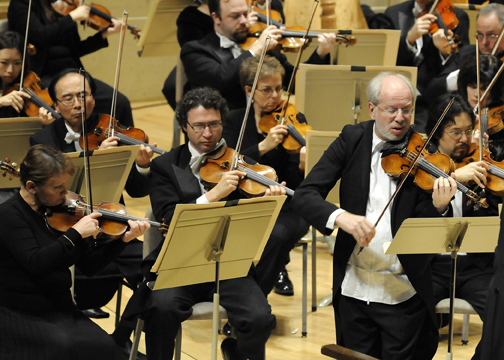Schumann and Strauss make a mixed night for Kremer, BSO

Gidon Kremer performs Schumann's Violin Concerto with the Boston Symphony Orchestra Thursday night. Photo: Stu Rosner
Gidon Kremer is one of those musicians who cannot play in a dull fashion even if he tried. From Bach to Piazzolla and Peteris Vasks, the Latvian violinist always finds a way to bring a fresh approach and put an individual topspin on repertoire, both familiar and obscure.
Such was the case Thursday night when Kremer returned to Symphony Hall to perform the Schumann Violin Concerto with conductor Rafael Frühbeck de Burgos and the Boston Symphony Orchestra, the soloist’s first BSO stand in six years.
The Violin Concerto was one of Schumann’s final works, and the mental strain and aural delusions that would lead to the composer’s breakdown, suicide attempt and confinement to an asylum where he would die at 46 had already begun.
To be sure, there are moments of characteristic melodic beauty in the concerto — the theme of the central movement is one of Schumann’s most beguiling inspirations. Yet it’s also not hard to understand why Brahms, Clara Schumann and Joseph Joachim — for whom Schumann wrote the concerto but who never performed it — decided against including the Violin Concerto in the first “complete” edition of Schumann’s works. The first movement is something of a mess with its unheavenly length and undeveloped themes, and the lightweight finale is pretty thin stuff, even for the most ardent Schumann admirer.
With the possible exception of Yehudi Menuhin who gave the concerto its belated American premiere in 1937, eighty years after its composition — and the BSO premiere the following year under Koussevitzky — no violinist has been a stronger advocate of this long-lost work than Gidon Kremer, who has even performed his own arrangement for chamber orchestra.
Yet Thursday night’s performance seemed at best a work in progress. Kremer brought bristling bravura to the fleeting virtuosic passages and plaintive expression to the inward moments, the violinist’s astringent lyricism nicely leavening some of the sucrose. Yet Kremer’s penchant for extreme tempos proved less successful here, with his lingering in the first movement making the music seem even more distended than usual.
This was very much a soloist-led performance, which was part of the problem. A firmer podium hand would have kept the music moving where de Burgos indulged Kremer’s dragging almost to the point of stasis. It was also surprising to see Kremer performing from a score in a work that has been in his repertoire for decades. (And his long white tuxedo shirt made it look like the violinist was moonlighting at Abe & Louie’s.)
The orchestra provided polished accompaniment but de Burgos’s stodgy and lumbering direction was too often out of synch with his soloist and sounded ponderous in the would-be lively finale.
Kremer’s encore of Valentin Silvestrov’s Serenade proved more communicative than the concerto with the Ukrainian composer’s ghostly, fragmented echo of Bach heard as if through a distorted sonic mirror.
Happily the performance of Richard Strauss’s Ein Heldenleben after intermission proved more successful than the Schumann concerto that preceded it. The composer’s autobiographical tone poem has come in for a fair share of criticism over the years, though not as much as Strauss’s even more personal — and still greatly underrated — Sinfonia domestica.
But Strauss’s “A Hero’s Life” remains a brilliant work, scored with audacity and immense panache, witty, consistently imaginative and grandly romantic without the slightest trace of sentimentality.
The Spanish conductor clearly has a strong feel for Strauss’s bold writing and outsized gestures, and the Hero’s striding main theme went with ample weight and swagger. The BSO woodwinds gave Strauss’s withering depiction of music critics (“The Hero’s Adversaries”) all the whiny, mincing squeaks and pompous irrelevance intended. Concertmaster Malcolm Lowe delivered the musical portrait of Strauss’s mercurial wife, soprano Pauline de Ahna (“The Hero’s Companion”) with elegant style and gleaming tone, conveying the haughty, querulous character yielding to a more loving and supportive expression. De Burgos and the BSO brass and percussion also brought full impact and the right mock-intensity to Strauss’ satiric battle with his critics with its off-kilter alarums and excursions.
The conductor was less convincing in the final sections. The “Hero’s Works of Peace” could have used more varied expression and dynamic subtlety — Strauss’s flowing quotations from his own works should pass by as in a self-communing reverie. The closing bars also seemed misjudged with Lowe’s refined violin and the too-loud solo horn not quite on the same page; likewise de Burgos’s rather crass final chord sounded out of place in the coda’s air of relaxed contentment.
The program will be repeated 1:30 p.m. Friday, 8 p.m. Saturday and 8 p.m. Tuesday. bso.org; 617-266-1200.
Posted in Performances



